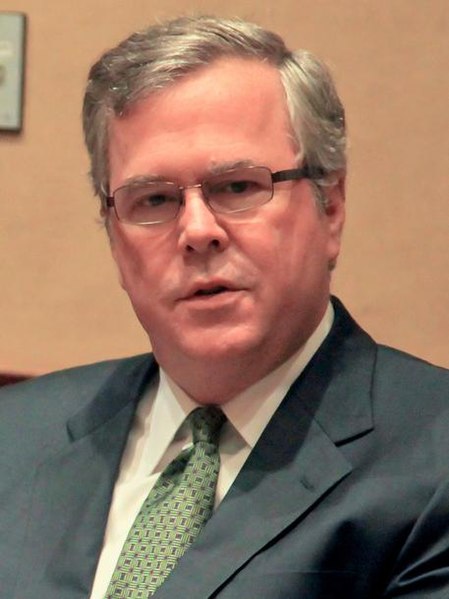 |
| Maybe he can get a job with the Trilateral Commission, establishing the New World Order? Maybe he can be president of Skull and Bones? Maybe he can run his own Fantasy Football team? |
Until now, due to health problems, I have missed commenting on the recent CNBC Republican debate. Apparently, they went on without me. Unfortunately, at this late date, I have little to add to what others have said. Darn.
Partly, this is because the results of this debate were uncommonly plain and clear cut. This one was historic. This is the sort of debate that everyone remembers for many years to come.
Usually, when this happens, this is because somebody blew up their candidacy in front of the cameras.
Yes, it was a disaster for Jeb Bush. I doubt he recovers, in this campaign or the next. His attack on Rubio was obvious old-style hack politics, which nobody is ready to tolerate any more, and Rubio described it accurately as just that, on the off-chance anyone had missed the point. Worse, because he was repeating a charge just made by the moderators, it looked as though Bush was of the moderators' party. Given that the bigger story of the night was the bias and incompetence of the moderators, this was disastrous. Then Bush managed to reinforce the impression of being in cahoots with the moderators (was he?) by agreeing with them on their silly and trivial fantasy football question. It even looked as though it was planted for him as a soft pitch. Christie then crushed both of them on it.
I'm sorry. I actually like Bush. It's over.
The other big story—indeed, the bigger and more historic--was, as mentioned, the moderators. It was not just that they were biased, but that they injected themselves into the story, interrupting and arguing with the candidates. That was sheer ego; they cannot have believed it was proper. The moderators behaved with visible arrogance and contempt, so obvious that the audience booed them. In the meantime, craving the job of political candidate, they had not done their own job, so that when Trump denied saying something, Becky Quick had no idea of her own source. And—invincible sense of privilege—she immediately decided it was Trump's responsibility to tell her where she read it. Their questions were juvenile and unimaginative. It's not as if they ran out of ideas; they never had any. The very first question was embarrassingly puerile and obvious: as they said themselves, it was a cliché from every job interview ever. How was that helpful to anyone? Many of them were the same questions asked at previous debates, thus wasting everyone's time. Or they were about fantasy football—as if they were just the first thoughts that came into fundamentally frivolous heads.
Lastly, and worstly, the moderators were caught several times lying. Moderators, not candidates. That's really gratuitous, isn't it? John Harwood made claims against Marco Rubio's tax plan that he had previously made in a column, and which he had already beeen required to retract. So he knew he was lying when he made them again, and then he lied again by denying he had retracted. At the end, when Trump took credit for negotiating the time for the debate down to two hours, Harwood interjected to insist “for the record” that it had always been planned for two hours. Another lie, and all of us who had been following the news knew it was a lie. Among other things, such lies show contempt for the viewing public.
We learned just how bad mainstream journalism has become. These, after all, are people who have reached the top of that profession. That means the entire barrell is rotten. My guess is that from now on, it will be axiomatic that journalism as we know it is a problem that needs to be fixed. Or removed from the process.
Donald Trump and Carly Fiorina, who had dominated previous debates, did not dominate this time. I do not think this was their fault. This too was due to the moderators, who asked them mostly the same questions they had been asked before. Given that everyone got only three questions, this gave them no opportunity to say anything new, and so froze them out of the debate. Nice going, moderators.
Rubio was the biggest winner by clearly besting Bush, his main rival for the support of the party establishment. Cruz got the single best moment and sound bite, in being the first to clearly call out the moderators, and in calling them out in a masterful way. Implicitly, he made himself the chief spokesperson for all the candidates, modelling a leadership role. Christie, Kasich, and Huckabee all were impressively articulate and appealing. Carson, I think, probably did himself a favour by admitting that he had changed his views, and was simply wrong in the past. That helps his image as an honest man, not a dishonest politician. Even Paul came across as more sensible and less doctrinaire this time. His pip stopped squeaking.
So, ironically, it was a good debate for most of the participants, despite all the failures of the moderators.













No comments:
Post a Comment